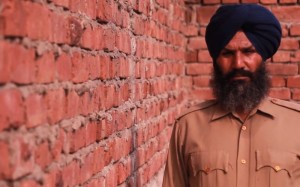Articles/Opinion
Whistleblower Exposes India’s Murderous Cops (a short review of The Last Killing documentary)
June 4, 2014 | By Simran Jeet Singh

Simran Jeet Singh (Author)
In 1994, a Punjabi cop filed a lawsuit against his colleagues accusing them of the secret torture and killing of innocents. Now, as his case is finally being heard by the Supreme Court, a new documentary traces his long fight for justice.
From 1991 to 1993, an Indian cop named Satwant Singh Manak claimed that he witnessed colleagues in the Punjab police force torturing and killing more than a dozen unarmed individuals. Corruption was rampant in the force at that time, and human rights groups like Human Rights Watch and Ensaaf reported that the Punjab police disappeared and executed thousands of individuals. Finally, after the death of a teenager, Manak decided to report the killings to his superiors—and thus kicked off a two-decade process of retaliation and court cases that culminated in Manak’s appeal to the Supreme Court of India this April. Now, a new documentary, The Last Killing—out on May 23—traces the story of Manak and the lives of the alleged victims on whose behalf he’s fought for so long.
The film, directed by Satinder Kaur and produced by Ensaaf, follows Manak’s saga back almost three decades ago, when he decided to join the Punjab police force as a bright-eyed cadet. It didn’t take long for Manak to witness the rot at the core of the institution. From 1991 to 1993, Manak says he watched, horrified, as fellow officers brutally beat, tortured and executed some 15 individuals—including, he says, Kulwant Singh, a young Punjabi.

Satwant Singh Manak (a still from The Last Killing documentary)
Manak decided to speak out and inform his superiors of the alleged killings—an act that led to his own detainment and, reportedly, his torture. After keeping him in illegal detention for 42 days, the Punjab police filed legal cases against him, accusing him of carrying an unlicensed weapon, theft, and firing on a police party with intent to kill—all false charges, Manak says. He was released on bail and promptly filed a lawsuit in October 1994 against his colleagues, accusing them of torturing and murdering 10 individuals.
As a known whistleblower on human-rights violations, Manak became a target for the police force’s ire. In the film, Manak describes how he spent the next several years on the run while the police persecuted his family back home. Officials picked up Manak’s father and detained him on trumped-up charges; Manak says they tortured him so severely, he ultimately succumbed to his injuries at home.
Despite all the threats and challenges, Manak refused to withdraw his case and continued to pursue his colleagues through the Indian justice system. In 2008, a judge from the High Court of Punjab & Haryana finally ordered the Central Bureau of Investigation (CBI) to look into the deaths. For the first time in many years, Manak had reason to hope. His relief was short-lived, however; the State of Punjab quickly appealed the decision and the case languished for another five years.
The Last Killing captures Manak’s interactions with family members of the Punjab police’s alleged victims and his efforts to organize these families to attend the hearings at the Punjab & Haryana High Court in 2013, nearly 20 years after he first filed his case. These moments in the documentary are particularly poignant, especially as family members reconcile Manak’s role as a former police officer seeking justice for their loved ones.
The hearings lead to a devastating turn of events: On November 26, 2013, a two-judge bench of the Punjab & Haryana High Court reversed the original decision, which had ordered the CBI to investigate the claims of extra-judicial torture and killings, and further ordered Manak to pay a fine to each of the accused officers.
In a particularly poignant moment in the documentary, after Manak has been ordered to pay the police for his claim, he states firmly: “I will not be intimidated. I will not be scared, nor intimidated, nor sold.”
Manak’s unwavering dedication, coupled with his insider knowledge about the human-rights abuses in Punjab, carry the viewer through the The Last Killing. The opening scene of the film illustrates the methodical and gruesome nature of the abuses. Manak describes how the police officers would dispose of the “disappeared” in order to avoid detection: before throwing a corpse in the river, the officers would sever the head and remove the intestines so the body would not float and be found.
This opening scene gives a sense of the unimaginable brutalities that Manak says he witnessed and has worked tirelessly to address. As the film follows Manak’s journey over the past two decades and chronicles the challenges he faces in finding justice for the families in his community, the viewer is left wondering about the state of justice in India and the independence of the judiciary. If the judicial system in the world’s largest democracy fails to punish illegal police killings in the light of overwhelming evidence and eyewitness accounts, one cannot help but ask questions about impunity, violence targeting minorities, and human-rights issues in modern India. As we learn in The Last Killing, these questions go beyond the so-called “Decade of Disappearances” that plagued the state of Punjab during late 1980s and early 1990s; the fact that Manak’s case remains unresolved reminds us that the stifling cloud of impunity continues to hang over the Indian state.
On April 2, 2014, Manak appealed his case to the Supreme Court of India. The appeal includes an affidavit that details Manak’s personal experiences of police torture as well as his account of his father’s death as a result of police torture. The Supreme Court’s decision on this case will shed light on how seriously India takes its obligations to protect human rights.
To learn more about the cases, view a trailer, and watch the full movie after its release on May 23, please visit ensaaf.org/manak.
Simran Jeet Singh is a scholar and activist who writes primarily on culture and religion. He has contributed regularly to a wide range of publications, including The New York Times, The Washington Post, and The Huffington Post. He has earned degrees from three universities—Harvard, Columbia, and Trinity—and he is currently completing his Ph.D. at Columbia University.
***
Above write-up was previously published at The Daily Beast at source page: http://www.thedailybeast.com/articles/2014/05/25/whistleblower-exposes-india-s-murderous-cops.html.
It’s reproduced as above for the information of the readers/ visitors of the Sikh Siyasat News (SSN).
To Get Sikh Siyasat News Alerts via WhatsApp:
(1) Save Our WhatsApp Number 0091-855-606-7689 to your phone contacts; and
(2) Send us Your Name via WhatsApp. Click Here to Send WhatsApp Message Now.
Sikh Siyasat is on Telegram Now. Subscribe to our Telegram Channel
Related Topics: Ensaaf, Human Rights, Satwant Singh Manak, The Last Killing




